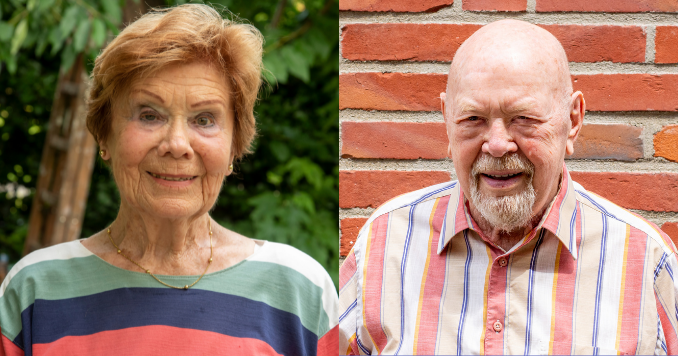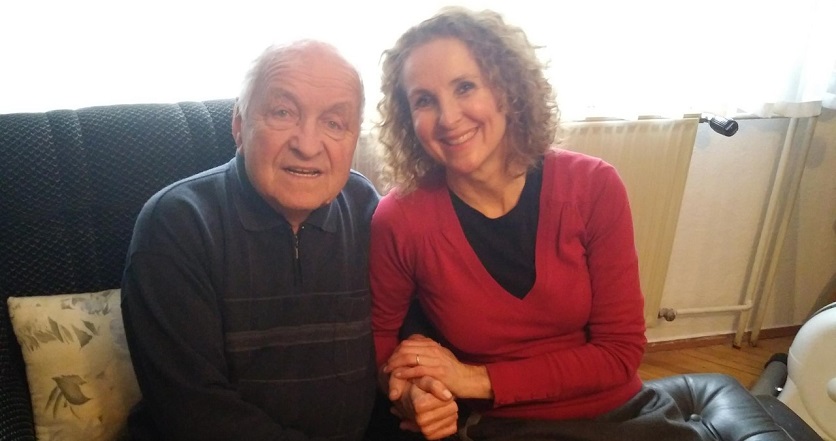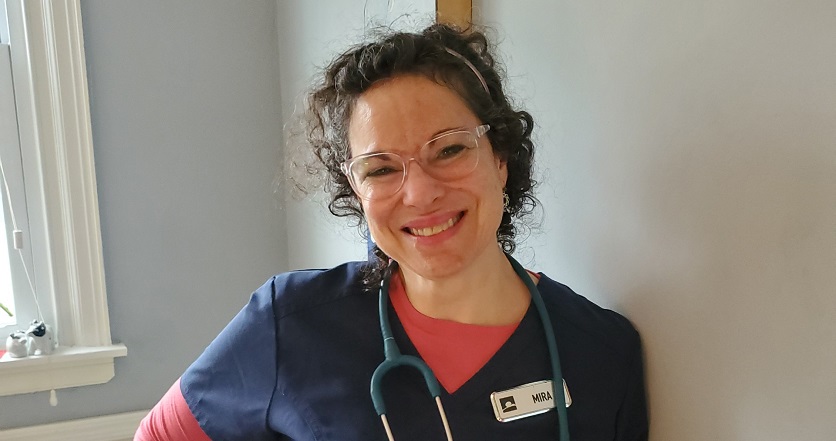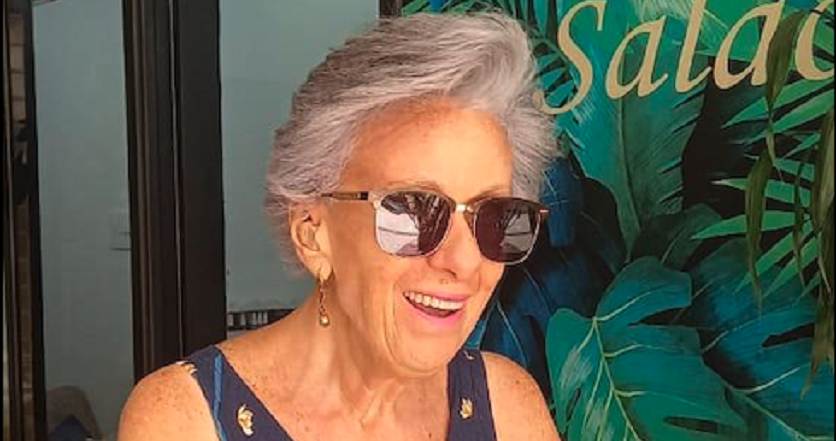Two Buddhists’ Perspectives on Aging

Kurt Ahrens and Christa Michaels, both 94 years old and from Germany, talk about how they encountered Buddhism and the life lessons they’ve learned over the past nine decades.
Kurt, you began practicing Nichiren Buddhism at the age of 89. How did that come about?
Kurt: One of my neighbors practices Nichiren Buddhism. She invited me to a Buddhist meeting, and we drove together to the SGI-Germany center in the town of Bingen to attend a meeting for elderly people. There, I met Soka Gakkai members from throughout Germany. I was excited because everyone participated actively, and I could feel they supported each other. I felt close to them, although they were actually complete strangers. The dialogues we had connected us. This moved me deeply.
After that meeting, I read the organization’s charter and found that all the issues mentioned in it correspond with my beliefs. This was the moment I decided I wanted to become a Soka Gakkai member. Up until that time, I was a convinced atheist. Though I grew up as an evangelical Christian, it never really resonated with me.
Christa, would you also share how you encountered Nichiren Buddhism?
Christa: This was a long time ago. I had a good rapport with one customer at my retail shop. She told me she was attending Buddhist meetings and asked if I wanted to join her sometime. This was at the beginning of the 1970s. I wasn’t fired up about the practice right away and was a little hesitant at first. You could say I was having a look at it from a distance. I told myself, “Wait and see. Is this really something for you?” My first years were definitely full of queries. Finally, at the beginning of the 80s, I decided to become a Soka Gakkai member and received the Gohonzon. Through my practice, I found serenity and a certain confidence. Today, I feel at home in Buddhism.
Both of you have experienced so much in your life in the past nine decades. How does it feel? What left an impression, shaped or changed you?
I gained an inner confidence through this Buddhist faith.
Christa: I can answer that from two angles. First, from the perspective of health. Just earlier, someone on the street asked me how I was. I said, “When you shake a ruin, some stones fall.” The person laughed. I didn’t want to tell them I was in terrible shape—that my back hurt, my knee doesn’t function as I want it to, that my shoulder’s damaged and that I actually needed a prosthetic. I don’t want to complain about my body, because I view it as a thing of wonder—with all the spare parts I have. I appreciate that I am still alive and that my body still functions, though with lots of little limitations. I can still wash and dry myself. It all takes some time, but it works. These are the challenges regarding my body.
Now, in terms of my spirit, how do I look back on my life? I grew up strictly Catholic and believed for a long time that all is willed by God and that I needed to beg Mother Mary for the things I wanted. This didn’t work. I couldn’t change my life by begging. There was this great search within myself, a yearning to find something. That’s why Buddhism was, in a certain sense, a salvation. Finally, it was clear: I myself decide about my life. I create my life, and I don’t wait for help from outside, as this may never come! I felt empowered. I gained an inner confidence through this Buddhist faith.
Kurt: I have been shaped by the war. I left my parents’ home when I was only 15 years old to receive training as a technical draftsman. I was far away from home and family. The war was horrible. The bombings—I feared for my life.
At the age of 17, I was conscripted into the army and served as paratrooper in Italy. I witnessed terrible things. That changes you. You start to see the world differently. You don’t know who to believe anymore. Where is hope in this case? Who restores everything back to good? These are the kinds of questions that plagued me.
After three years as a prisoner of war, I returned to my parents in Duesseldorf, shortly before my 22nd birthday. On the night of my birthday, I left home again, as I couldn’t bare the commanding tone of my father any longer. Luckily, I had already met my wife by that time. Together with her, I created my own family, and we had a daughter. I was a happy man at this time. Our marriage was strong up until her death in 2000. I chant for her and often have the feeling that she is still here.
President Daisaku Ikeda says that there is no wall that one can’t break through and that older people who practice Nichiren Buddhism have conviction because they have overcome many difficulties. Do you agree with this?
Through Buddhism, I was able to establish the mindset that what we do now, from this moment on, is what matters.
Kurt: Chanting helps me deal with the painful memories of the war. I am still not free of those memories. I find it astonishing that, with this practice, I am able to take a step back and look at things differently. The people who experienced the Second World War were left alone to deal with their experiences. There were no therapists or psychiatrists to help them deal with their trauma. Through Buddhism, I was able to establish the mindset that what we do now, from this moment on, is what matters. Chanting, which I have been doing now for five years, strengthened me mentally. My belief in my own capabilities has become stronger.
Christa: I believe that embracing difficulties is important. Things happen to us all the time, things we couldn’t have imagined. Things change continuously. Your health might decline or you might lose your apartment—things happen that are not hoped for and still you have to cope with the new reality. I can say that nothing can knock me off balance anymore. I no longer fear anything. Let me put it this way: when a wall appears in front of me, I start working on getting over it, even though I may not know exactly how.
In Buddhism, aging is considered one of the four universal sufferings. What has your experience of aging been?
Christa: I don’t have any problem with aging at all. I am constantly grateful for still being able to walk straight. Actually, I’m a little bit weak-kneed, with low blood pressure, and I cling to my walker, but still, I am a wonder for my age! I smarten up a little bit when I go out in the street, of course, always with my walker. I smile when coming across someone. I am content with my life. My small pension and life insurance may not be something to jump for joy about, but I have a small apartment in an area with greenery, and I am so thankful for having a large tree in front of my house.
Kurt: There are days when life is not easy, when I realize that my body doesn’t do what my mind wants it to do anymore. I developed Parkinson’s disease, and my body often doesn’t obey me—for example, when I have a mental block while speaking, and I suddenly can’t finish a sentence. This is not easy and can be especially embarrassing when speaking to strangers. On good days, on the other hand, I still feel young, at least 20 years younger than I really am.
Nichiren Buddhism teaches that life is eternal and that one can only truly understand life once one confronts the reality of death. What is your outlook on the end of life?
Kurt: I grappled with this topic intensely with the death of my wife. At the time, I hadn’t yet been introduced to Buddhism. I deal with death differently now. Death is part of life because physical existence is not limitless. However, when one dies, one returns to the cycle of nature, and in this sense, life is eternal. I can accept this concept very well. I have no fears of death. Of course, I don’t want to suffer from pain—no one wants that.
Christa: Every evening, during my Buddhist prayers for the deceased, I think of my deep hope to be able to leave the world in a comfortable and reasonable way. One can meet death in a terrible, miserable way in bed. I know that I have to go eventually, and this is certainly quite soon. Just this week, my last schoolfriend passed away. I would like to transition in a dignified way. I don’t know how I will be reborn, but I know I will come back somehow. I don’t think that everything is over with my final breath. Something will continue to evolve. The universe is too large for it not to.
I have an emergency button hanging around my neck that I can press when something happens to me, since there is no one else here. I have been living alone for decades. I have no family, no partner. I always thought I would have someone with me, but I had to learn to deal with being alone. I learned to deal with this a long time ago and can do very well for myself.
I am not scared of death. I am happy that I can live a little bit more even if I’m a little bit impaired, a little bit clumsy and a little bit forgetful. As long as I am in good spirits and my hairstylist comes from time to time to refresh my hairdo, I am extremely well. I have experienced enough. This life was fantastically long and colorful. I am content—I cannot expect more.
President Ikeda says that his mentor, Josei Toda, always emphasized that our final years should be like a golden sunset. What do you think of this image of a golden sunset?
Kurt: I agree with that. I look back at a fulfilling life—with all its up and downs—with great gratitude. When the sun comes up in the morning, I am thankful for being able to experience and create a new day.
Christa: The picture of the sunset resonates wonderfully. Unfortunately, we are destroying the environment at the moment. What we do with our world worries me. Sadly, we are not about to wake up. Nature is so beautiful; we should do everything possible to sustain it. I am not young enough, otherwise I would join a party and strive to save the world and galvanize people and make them more modest. We are actually like caterpillars eating everything up.
Based on your rich life experience, do you have any advice for the youth of today?
Kurt: You need to set goals in life. When you have a goal, then you must never give up on it. You have to believe in yourself. I want to urge youth to engage with the Soka Gakkai Charter. There are so many issues in it which would excite youth—issues that many young people are demanding action on and protesting out on the streets for. That’s why I hope that at Buddhist meetings for guests the Charter is shared. It is so important to learn about the principles of the Soka Gakkai.
Christa: I don’t really fit in this world anymore. I am far too strict in my views. I thought about what I would say to my child if I were a mother, and the word that came to mind was discipline. It’s too harsh a word, though. So how can I describe what I mean without upsetting young people? And then, I thought of the following message: You must go out into the world and not be mistrusting. Always assume that the person in front of you is a good person. Do lots of good things, even if you think that you won’t get anything in return, because you definitely will, though sometimes you will have to wait. Nothing is lost in this world, no good word or action is lost. This is my conviction, and this is what I can offer to young people.
Adapted from issue 244 of Forum (September/October 2021), SGI-Germany.







